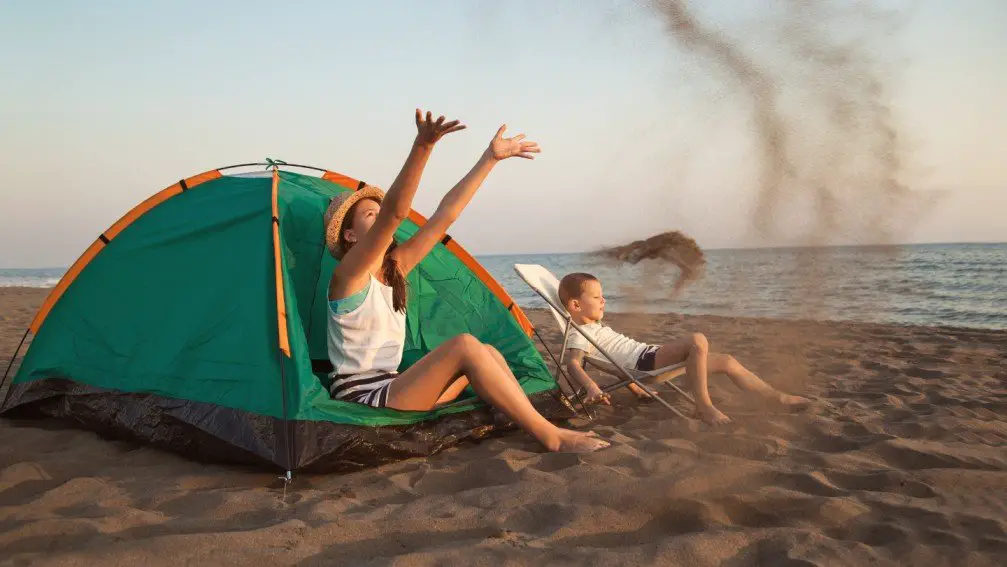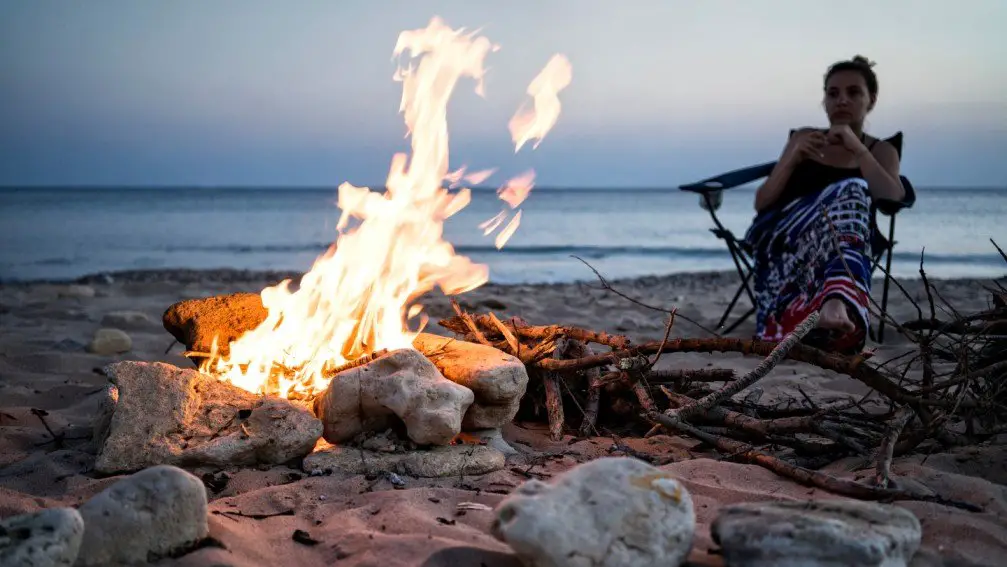Yes, it is generally safe to camp on the beach. However, you must take certain precautions to ensure safety.
Camping on the beach offers a unique experience with beautiful views and soothing sounds of the ocean. Make sure to choose a legal camping spot, as some beaches have restrictions. Check the weather forecast and tide schedules to avoid unexpected high tides.
Bring essential gear like sturdy tents, appropriate clothing, and enough food and water. Be mindful of local wildlife and practice Leave No Trace principles to protect the environment. With proper preparation and awareness, beach camping can be a safe and memorable adventure.
Beach Camping Popularity
Many people love beach camping. It offers fresh air and stunning views. Outdoor recreation has risen in recent years. Beach camping is a great way to enjoy nature. Families and friends find it fun and relaxing. People seek adventure on sandy shores. Beach camping is a growing trend.
Coastal campsites attract many visitors. The sound of waves is soothing. Ocean views are breathtaking. Campers enjoy swimming and surfing. Coastal areas offer unique wildlife. Sunsets are beautiful at the beach. Coastal campsites provide a peaceful escape.
Potential Hazards Of Beach Camping
Beach tides can change quickly. Water levels may rise during high tide. Campers should set up tents away from the water. Rising water can flood campsites. Always check the tide schedule before camping.
Animals live on the beach too. Birds and crabs are common. Some may come near your camp. Keep food stored safely. This helps avoid attracting wildlife. Be aware of local animals and their habits.
Beach weather can change fast. Storms may appear suddenly. Wind can be strong near the ocean. Always bring waterproof gear. Tents should be secured tightly. Check the weather forecast before going.
Choosing The Right Beach
Check if camping is allowed on the beach. Some beaches have strict rules. Always look for signs or ask local authorities. Breaking rules can lead to fines.
Be aware of tides and weather conditions. High tide can flood your campsite. Strong winds can make it unsafe. Choose a spot away from the water.
Look for beaches with public restrooms. Access to clean water is important. Make sure the beach is easy to reach by car or foot. Check if there are lifeguards on duty.
Safe Tent Setup
Always set up your tent far from the water. The water can rise quickly. Keep at least 100 feet away. This helps you stay safe from waves and tides.
Use special sand anchors for your tent. Regular stakes do not work well in sand. You can also use bags filled with sand. These help keep your tent in place. Make sure they are buried deep.
Check the tide timetable before you camp. High tide can flood your tent area. Low tide gives you more space. Always know when the tides change. This helps you avoid any surprises.
Campfire Safety
Camping on the beach can be safe with proper precautions. Always choose a designated camping area and monitor weather conditions closely. Ensure campfires are permitted and follow local regulations to prevent hazards.
Regulations And Restrictions
Check local rules before starting a campfire. Some beaches ban fires for safety. Follow posted signs and guidelines. Always use designated fire pits if available. These rules help keep everyone safe.
Environmental Impact
Fires can harm wildlife and plants. Use small fires to reduce damage. Avoid burning trash or plastics. These materials release toxic fumes. Always leave the area clean. Carry out all waste to protect the environment.
Extinguishing Techniques
Always fully extinguish your campfire. Use water, not sand, to put out flames. Stir ashes and add more water until cold. Never leave until you are sure the fire is out. This prevents wildfires and keeps the beach safe.
Dealing With Coastal Wildlife
Coastal areas have many different animals. Some common species include seagulls, crabs, and jellyfish. Seagulls may try to steal your food. Crabs can pinch if stepped on. Jellyfish stings can be painful. Always be careful around these animals. Use safe practices to avoid risks.
Store food in sealed containers. This keeps animals away. Hang food bags from trees if possible. Keep the camp area clean. Never leave food out at night. This reduces animal visits. Use coolers with tight lids. Always lock food inside. These practices keep you safe.
Keep your campsite tidy. Dispose of trash properly. Do not leave scraps of food around. Use biodegradable soap for washing. Avoid strong-smelling products. Perfumes can attract animals. Store all food and scented items safely. This makes your camp less inviting to wildlife.
Weather Preparedness
Always check the weather forecast before heading to the beach. This helps you prepare for any bad weather. Make sure to monitor the weather regularly. Use a reliable weather app for updates. Sudden changes can happen quickly. Stay informed to stay safe.
Identify potential emergency shelters nearby. This could be a sturdy building or a designated shelter area. Knowing where to go can save lives during storms. Always have a backup plan. Keep this information handy and share it with your group.
Bring essential gear to handle changing weather conditions. Items like waterproof tents and tarps are crucial. Pack warm clothing and rain gear. A portable weather radio can be very helpful. Always carry extra food and water. Being prepared ensures a safer camping experience.
Environmental Conservation
Always pack out all your trash. Never leave any items behind. Pick up litter found on the beach. Avoid disturbing plants and animals. Use a portable stove instead of making a fire. Camp on durable surfaces to minimize impact. Respect other visitors and keep noise levels low.
Dunes are very fragile. Walking on them can cause damage. Use designated paths to access the beach. Avoid setting up camp on dunes. Plants on dunes help prevent erosion. Protect these plants by staying off the dunes. Always observe signs and barriers.
Proper waste management is crucial. Bring biodegradable soap for washing dishes. Always use a portable toilet if available. If no toilet, dig a small hole for human waste. Cover it well after use. Pack out all toilet paper and hygiene products. Never bury or burn trash on the beach.
Health And Hygiene
Camping on the beach can be safe with proper hygiene practices. Ensure clean water sources and dispose of waste responsibly. Always prioritize personal health and environmental care while enjoying nature.
Water Purification
Beach water can be unsafe to drink. Always purify water before drinking. Use a portable water filter or boiling method. Chemical tablets can also purify water. Never drink directly from the sea.
Sanitation Solutions
Proper sanitation prevents sickness. Bring a portable toilet or dig a cat hole for waste. Use biodegradable soap for washing. Always have hand sanitizer ready. Keep the beach clean and dispose of waste properly.
Sun Protection
Sunburn can ruin your trip. Apply sunscreen every two hours. Wear a hat and sunglasses for extra protection. Set up a shade tent to stay cool. Drink plenty of water to stay hydrated.
Beach Camping With Kids
Always give a safety briefing before camping. Teach kids about the ocean’s currents and the importance of staying close to the campsite. Make sure they know where the first aid kit is kept. Explain the need to stay away from sharp rocks and other hazards.
Bring along some beach toys like buckets and shovels. Organize a scavenger hunt to find shells and pebbles. Fly a kite or build a sandcastle together. Plan a small treasure hunt with simple clues for extra fun.
Pack a comfortable sleeping bag for each kid. Make sure to bring a sun hat and plenty of sunscreen. A small, child-sized backpack can help them carry their own essentials. Don’t forget to pack some snacks and water to keep them hydrated and happy.

Emergency Situations
Always have a first aid kit with you. Know how to treat cuts and bruises. Clean wounds to avoid infection. Learn CPR for emergencies. Know how to stop bleeding. Keep bandages and antiseptic handy. Treat burns with cool water. Avoid using ice on burns.
Use a whistle to attract attention. Create smoke signals with a fire. Use a mirror to reflect sunlight. Wave a bright cloth or flag. Write SOS in the sand. Make large marks with rocks or driftwood. Carry a flashlight for night signals.
Know the local emergency numbers. Have a charged phone always. Know the nearest hospital or clinic. Check for lifeguard stations nearby. Ask locals about safe spots. Have a map of the area. Know the quickest route to help. Familiarize with rescue protocols.
Maximizing Your Beach Camping Experience
Always show respect for the local culture. Learn about the customs before your trip. Follow the rules and guidelines on the beach. Avoid littering and keep the beach clean. Be polite to the local people and other campers. This will make your camping experience more enjoyable and peaceful.
Plan your trip during the best season. Avoid going during the rainy season. Check the weather forecast before leaving. This will help you avoid any bad weather. Arrive early to find the best spot. This ensures you have plenty of time to set up your camp.
Enjoy various activities on the beach. Swim in the clear water and play beach games. Build sandcastles with friends or family. Go for a walk along the shore. Collect beautiful seashells as souvenirs. Watch the sunset for a memorable experience.
FAQs:
Is It OK to Take A Tent To The Beach?
Yes, you can take a tent to the beach. Ensure it’s permitted by local regulations. Use sand anchors for stability.
Is It Safe To Sleep On The Beach?
Sleeping on the beach can be risky. Factors include weather, tides, wildlife, and local regulations. Always check safety guidelines.
How Do You Camp Comfortably On The Beach?
Choose a flat spot, bring shade, use a sturdy tent, pack light bedding, and keep essentials handy.
Is It Safe To Camp On The Beach In Port Aransas?
Yes, camping on the beach in Port Aransas is generally safe. Follow local rules and stay aware of weather conditions. Always practice beach safety and respect wildlife.
Camping on the beach can be a unique adventure. Always check local regulations and tides before setting up. Safety precautions enhance your experience. Proper planning ensures an enjoyable and safe beach camping trip. Respect the environment to maintain its natural beauty for future campers.
Enjoy your beach camping adventure responsibly.



